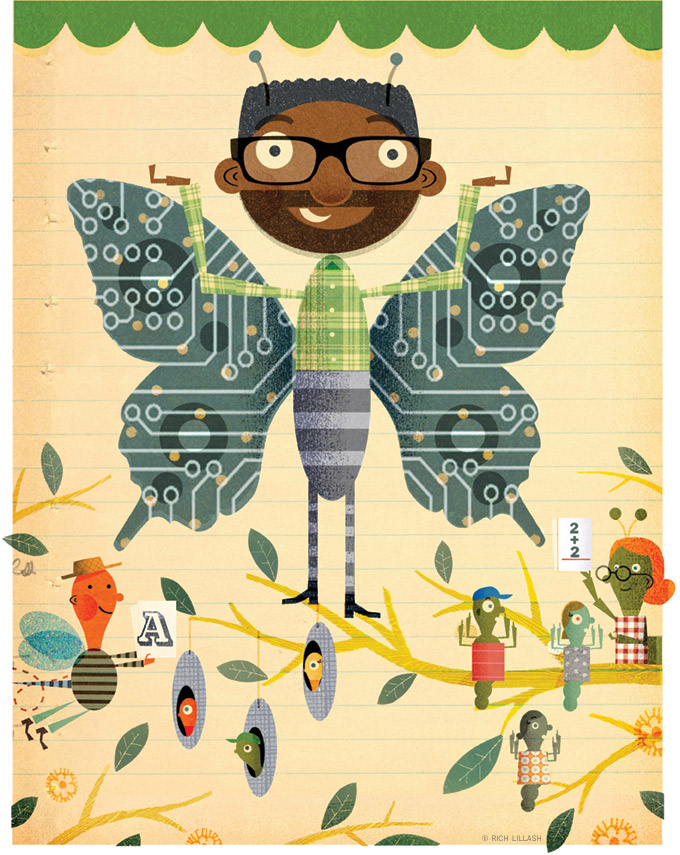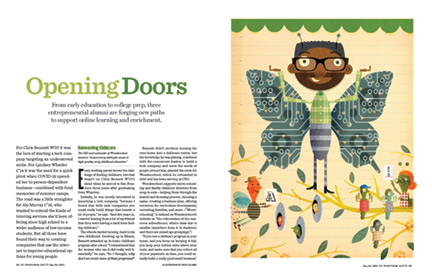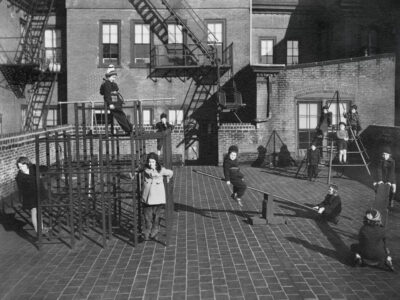
From early education to college prep, three entrepreneurial alumni are forging new paths to support online learning and enrichment.
By Holly Leber Simmons, Alyson Krueger, and Nicole Perry
Illustrations by Rich Lillash

For Chris Bennett W’07 it was the lure of starting a tech company targeting an underserved niche. For Lyndsey Wheeler C’14 it was the need for a quick pivot when COVID-19 upended her in-person-dependent business—combined with fond memories of summer camps. The road was a little straighter for Aly Murray C’16, who wanted to extend the kinds of tutoring services she’d been offering since high school to a wider audience of low-income students. But all three have found their way to creating companies that use the internet to improve educational options for young people.
Reinventing Childcare
The CEO and cofounder of Wonderschool wants to “ensure every child gets access to high-quality early childhood education.”
Every working parent knows the challenge of finding childcare, but that wasn’t on Chris Bennett W’07’s mind when he moved to San Francisco three years after graduating from Wharton.
Initially, he was mostly interested in launching a tech company, “because I found that with tech companies you could really build things that benefit a lot of people,” he says. “And five years in, I started hearing from a lot of my friends that they were having a hard time finding childcare.”
The wheels started turning, back to his own childhood. Growing up in Miami, Bennett attended an in-home childcare program after school. “I remembered that the woman who ran it did really well financially,” he says. “So I thought, why don’t we create more of these programs?”
Bennett didn’t envision turning his own home into a childcare center, but the knowledge he was gaining, combined with the concurrent desires to build a tech company and meet the needs of people around him, planted the seeds for Wonderschool, which he cofounded in 2016 and has been serving as CEO.
Wonderschool supports micro-schooling and family childcare directors from soup to nuts—helping them through the launch and licensing process, choosing a name, creating a business plan, offering resources for curriculum development, recruiting families, and more. (“Micro-schooling” is defined on Wonderschool’s website as “the reinvention of the one-room schoolhouse, where class size is smaller (anywhere from 4–15 students) and there are mixed age groupings.”)
“If you run a childcare program in your home, and you focus on keeping it full, you keep your tuition rates above your costs, and make sure that you collect all of your payments on time, you could actually build a really good small business,” he says. For $150 per month, Wonderschool provides childcare entrepreneurs with a digital business-support platform that helps them launch their businesses, manage billing and enrollment, collect payments, and interact with families.
Wonderschool has a family-facing side as well: information resources including a search engine to find the care environments with the desired qualities. There is no set curriculum or philosophy—each care center is individualized. For families that require extra guidance, Wonderschool partners with Cleo, an app designed for working parents, which can be offered as an employee benefit.
Indeed, the road to finding good childcare is riddled with potholes. “Parents are sort of clueless on how to solve this problem,” Bennett says. “They need help with it.” And even with knowledge, there are a lack of programs. “There’s just not enough,” Bennett says. “Parents don’t find high quality childcare near them.” And finally there’s the cost. “A lot of parents don’t have enough money for it. They can’t afford high-quality childcare. And so that’s where I think our governments really need to step in and provide support.”
Costs range widely by region and locality, but full-time daycare for an infant averages around $10,000 annually in the US. According to a 2019 report from the Center for American Progress, the average family spends roughly 10 percent of its income on childcare—significantly higher than the 7 percent affordability benchmark set by the US Department of Health and Human Services.
Bennett, who does not have children, found himself motivated to respond to the need for childcare access when he met Laura Jana, a pediatrician and early childhood development expert. “She explained to me that a lot of the social-emotional skills that I use as a CEO I learned in preschool—that 90 percent of the brain develops before age five,” he says. “Connecting all of those dots led me to start this company.”
Lacking professional experience in early childhood education, Bennett hired someone with nearly two decades of experience in the field to be the head of early care and education. Wonderschool doesn’t focus on educational curricula—that’s up to each individual owner—but it does offer curriculum support, so it was important to see things through the providers’ eyes.
Working with a handful of early childhood teachers, the company created and beta-tested childcare programs in two rented houses in Berkeley and Los Angeles, each one serving 12 families.
“It was really scary and exhilarating,” he says. “I didn’t know how to create an early childhood education program. I didn’t know how to market a program. I just had to learn along the way. We learned everything we could about starting an operating childcare program, and realized it was something we could start to scale. And it was really rewarding to see how happy parents were with it. It was a really great addition to the community.”
The mission of Wonderschool, which has schools on its platform in cities throughout the country, “is to ensure every child gets access to high-quality early childhood education that helps them meet their needs,” Bennett says.
Although Wonderschool doesn’t promote any particular approach, one general advantage of a microschool is the low student-teacher ratio, which presents the opportunity to practice mastery learning, a concept that allows students the opportunity to pursue a subject until they fully grasp it.
“Another big benefit of microschools,” says Bennett, “is that as a parent, you actually have more choice, because you’re able to pick a curriculum or a teacher that you believe in.”
The son of Honduran immigrants, Bennett saw his parents work hard to give him a quality education, from preschool to Penn, and he wanted to be able to offer the same sort of access to excellent early education to other families, particularly in underserved communities.
“[My parents] always wanted to make sure I did really well, they wanted to make sure I didn’t do things to put myself behind,” he says. “They were always mindful of the racism that exists in the country and making sure I wasn’t harmed by it, and I was prepared for it.”
Bennett says that socioeconomic and demographic metrics show that Wonderschool is serving a wide spectrum of families. “Every type of person uses Wonderschool. We have venture capitalists; we have people who are in the lowest median income in their communities. Everyone needs access to childcare. It’s like, who eats food?
“It’s very much part of the mission of the company, to ensure all children get access to high quality, early childhood education, that helps them realize their potential. That’s all children, Black children, white children, Latin children, everyone, in all communities, and so we want to really be mindful of what’s happening in certain communities, for certain types of children, and solve for that with our platform.”
—Holly Leber Simmons

Super Screen Time
A young entrepreneur believes a virtual summer camp can thrive all year long—even in a post-pandemic world.
In April 2020, Lyndsey Wheeler C’14 desperately needed a side hustle. Here/Now, her company that organized in-person mixers for singles, was reeling from the pandemic. Short on money, she considered tutoring children but realized it couldn’t satisfy her creative itch. Then it dawned on her: Why not run a virtual summer camp?
“Every parent I knew was in a pit of despair trying to homeschool kids,” she says. “What is more fun than summer camp? It’s a place where everyone’s worries go away.”
And so she launched Supernow, a virtual platform that provides live, interactive classes for kids. Initially, with the pandemic in full swing in 2020, it operated like a summer camp with children signing up for two-week sessions. Every day had a different theme (on “rock star day,” kids made mics out of tinfoil and competed in air guitar contests), and actors took them on educational adventures they could do from home. “I originally thought we would hire teachers, but we needed people who could be really silly and engaging,” Wheeler says. “All of these out-of-work actors signed up.”
Liffey the Earthy Emerald Crusader, for example, got kids outside, in their yards and on the sidewalk, to learn about sustainability. Queen Dee, the drag queen, helped kids learn how to express themselves authentically through art and theater projects. The participants not only got to watch these fun characters but engage with them. “It’s like watching Sesame Street and being able to chat with Elmo,” says Rachel Breitenwischer, Wheeler’s business partner. “Or being able to talk to Mister Rogers and tell him you feel sad today.”
Kids form bonds with the characters, observes Jasara Norton, whose six-year-old son started taking classes in summer 2020. “He really loves Captain Tamara because it’s all about going on an imaginative adventure that includes miming and discovering what he can convey through facial expressions and body movement.”
With many kids returning to in-person school and camp in 2021, Supernow shifted to a subscription model; parents pay $18 a month to access unlimited live classes throughout the week. The company, which has raised money from outside investors, currently has four full-time staff members and 20 contractors, along with an evolving entourage of actors and other experts across a range of disciplines, to run classes on movement, music, arts and crafts, STEM, mindfulness, and more.
“We want to be Peloton meets PBS,” Wheeler says. “We want to make it possible for the most people around the world to get the best content ever for their kids.”
Wheeler’s passion for summer camp comes from her own busy childhood in Alexandria, Virginia. “I participated in tons of camps, afterschool activities, and classes,” she says. At one of them—Camp Invention, a program run by the National Inventors Hall of Fame—she gained fond memories of creating new types of board games and taking apart old household items and reassembling them as new inventions. (Some activities she remembers have made their way into Supernow’s curriculum.)
After her time at Penn, where she studied international relations and journalism, she worked at Fahrenheit 212, a global innovation consultancy where she got a taste for designing consumer experiences. For Saks Fifth Avenue, she concocted a loyalty program. For Richard Branson’s adult-only cruise line Virgin Voyages, she envisioned programming for the ships. In her free time, she visited raves, immersive theater productions, and festivals like Burning Man to see what kind of adventures truly made an impact on people.
She then spent two years at Rent the Runway, a designer clothes rental company where she met Breitenwischer. The duo spent so much time sitting in a conference room dreaming up new companies, they decided to quit and go for it.
They launched Here/Now in the spring of 2019 at a 24-person event at a shoe store in New York City. “We tried to make it feel like a speakeasy,” says Wheeler. “Everyone took a service elevator up, and they didn’t really know what they were walking into. Inside everyone was ready to mingle and have fun.” They made rules to keep everyone present, including no cell phones and no work talk—“a crutch that people hide behind.”
Before the pandemic, Here/Now was running weekly events and about to start a subscription service where customers paid a set price for unlimited or discounted events. After the pandemic shut down in-person mingling, they experimented with virtual dating. It was fun, but the business model was untenable; not enough people would pay to meet strangers on Zoom.
Supernow solved a pressing problem for parents, says Norton. “My then five-year-old son was home all the time, and I knew he needed a social outlet,” she says.
“We heard from many parents that they were worried about what lessons their kids were missing by being out of a social environment,” Wheeler says. “We doubled down on that in our sessions. For example, we are teaching kids about volcanoes, but it’s being taught by a mad scientist who calls on the kids and listens to them and has them talk to each other.”
Because of its virtual format, Supernow has attracted an international clientele. “We have people in Venezuela, India, Budapest, London, Australia, and Morocco,” Breitenwischer says. “Parents seem to like it because their kids are meeting other kids from all over the world and interacting with them live. We are writing that into our curriculum, helping our students understand each other’s differences and similarities.”
Wheeler said that’s the beauty of a virtual format. “Peloton taught us that you can be in the middle of nowhere North Dakota, but still take a class from the best cycling instructor by using these new platforms,” she says. “That’s the vision here.”
—Alyson Krueger

Tutoring Them to the Top
UPchieve empowers low-income high school students to reach their educational goals with free 24/7 online tutoring and college coaching.
“One of the best moments in a tutoring session is when something clicks for the student you’re helping,” says Aly Murray C’16, cofounder and executive director of UPchieve, a free online tutoring and college counseling nonprofit for low-income high school students. “It’s literally the message that is just a long string of O’s and a long string of H’s.”
Oooohhhh!: This feeling of relief, to finally understand something you were struggling to understand, is “a great moment for a learner, and then by extension, a great moment for the tutor,” she says.
Murray, who started tutoring math and science in high school as a way to earn money, founded UPchieve in 2016 while she was working at J. P. Morgan. She saw it as a way to help level the playing field for low-income students like her, so they can get into college and eventually achieve upward mobility (hence the name, UPchieve).
“If you don’t get middle school math, and you never get a tutor, then you’re going to go into every subsequent math class feeling stupid and falling further and further behind, growing to hate math and hate school because you never got that little bit of help that you needed to understand something,” she explains. “I really want any student, regardless of their starting point, to be able to get support on their journey at UPchieve.”
Raised by a single mother who emigrated from Cuba, Murray was the first in her family to attend college. Math came easy to her but applying to colleges did not. “There are a lot of things about my journey, where I look back and think, ‘Wow, these things were so much harder than they should have been,’” she recalls about growing up in a first-generation American, low-income household.
In the 10th grade, maxing out her public school’s Advanced Placement courses, she thought school was “a waste of time,” and that she should “just drop out, get my GED, and go straight to college.” She went to her guidance counselor, who told her, “’Well, you probably shouldn’t do that, but we do have a dual enrollment program with the local community college.’” For Murray’s last two years of high school, she enrolled full time at a community college and received her associate’s degree at age 18. But, as she puts it, she “missed out on the regular, limited guidance counseling that a student normally would have received if they were still in a high school environment,” and that’s when her college application process became complicated.
She applied to “a ton of random schools nearby” and got into a lot of them—but realized their financial aid offerings were nil. Even the state school would be too expensive. She made spreadsheets to track her research, and somewhere along the way discovered the existence of “no-loan schools,” which determine how much a student’s family can pay and then offer the remaining balance as a grant and work–study job. (Penn’s no-loan policy went into effect in 2009.)
“So my new goal became making myself competitive enough to transfer to one of those schools,” she says, explaining that she enrolled a third year at community college to load up on science, technology, engineering, and math courses that would help her stand out in applications.
“There’s a lot of interesting stats about how students who begin at the bottom quintile of the income scale, once they get into a selective university like Penn, they have a huge chance [of financial success]—something like 60 percent of students from that bottom quintile will end up in the top quintile after attending a school like Penn,” says Murray. They just have to get through that first door.
To that end, UPchieve’s mission is “to democratize access to academic support so that all students have an equal opportunity to finish high school, attend college, and achieve upward mobility.”
Murray quit her job at J. P. Morgan in 2018 to work on UPchieve full time. It now has nine full-time staff members, a pool of more than 7,000 volunteer tutors and college coaches, and $1 million in funding from individual donors and corporate partners. The organization has also won a number of early-stage business competitions, which come with cash prizes. Recently it received its first grant, from the Bill and Melinda Gates Foundation. “That was a big milestone,” says Murray, who has been featured on the Forbes “30 Under 30” list in Education (2021) and honored as a Roddenberry Fellow (2021).
“The cost per student is actually pretty low,” she says. “Because we’re tech-enabled and volunteers are the ones who do the tutoring, it costs us about $10 to give one student access for an entire year of unlimited academic support.”
That support includes “judgement-free” responses from math and science tutors 24/7 (more subjects will be rolled out later) and help with the college application process, from the exploration phase to essay writing. Students can access UPchieve from any internet-enabled device, and a mobile app was added one month into the COVID-19 pandemic when demand from students skyrocketed. “When schools started closing, it was so obvious that students needed UPchieve and they needed it now,” Murray says.
To date, UPchieve has helped more than 2,700 students in all 50 states, and about 75 percent are Black or Hispanic. Students who attend Title I high schools, which serve predominantly low-income families, are eligible to use the platform for free, and others can apply.
“There are about 8 million low-income high school students in the US today,” says Murray. “By 2030, our goal is to scale free tutoring to all of them.”
Murray points to a student named Esmeralda as an emblem of the program’s mission. She started using UPchieve during the pandemic and “very quickly racked up almost 100 sessions.” Esmeralda reported she had struggled her entire life with math, but “this version of learning was really empowering for her,” says Murray, and she felt she had learned more with UPchieve than she had “in pretty much her entire life.”
“Some students who we’ve interviewed, especially over the last year, have talked about how hard school has been during COVID and then also just how much UPchieve has made it possible for them to keep learning,” she explains. “For a lot of students, it’s the first time they feel like they’ve been able to understand math and science.”—NP




